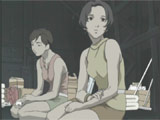

Quick Links:
RahXephon, Volume 7: Crescendo
RahXephon in its later parts has forced me to think from multiple points of view in order to form an opinion. As an emotional being with an interest in art, I can appreciate it and even enjoy it. As a reviewer and sometimes critic, I can appreciate the layout and intricacy of the story but find multiple problems with its execution. And as an ordinary guy viewing what's supposed to be a work of entertainment, I just plain don't like it. I'll try to explain all three viewpoints in this - my final review of the series.
The seventh volume is all over the place, and it needed to be to wrap things up. There is a lot of fighting between the Mu and human forces. We find out what the Bähbem foundation is all about, sort of. And the rest plays out not unlike a Shakespearian tragedy, with a large body count and an impressive amount of melodrama. (Just as a side note - I like Shakespeare's tragedies in my studies, but not my entertainment.) Despite all the drama and deaths, the ending to RahXephon is arguably a happy one. The details muddle its effectiveness, but it has a lot of feeling and is enjoyable. There is also a lot of beauty in the show's artistic expression, especially at the end. From the transformation of the RahXephon to a picturesque ending scene with Kamina and Mishima, the visuals are intelligently directed and rendered beautifully.
Too bad I can't say the same about the story. All the ingredients were present to create a fine pastry, but it was taken out of the oven too early, and the remnants of the failed experiment droop all over each other. How much worth a person can draw out this story depends on how much time he/she is willing to spend salvaging the sweet parts out of the mess. It isn't the lack of clarity to take issue with - the feelings expressed by the characters make the stronger story elements crystal clear, in fact - but the lack of focus is what does the story in. Many stories effectively weave several plot threads together cohesively and many do not, and the difference between the two is in the strength of the individual threads as well as how well they are integrated. If one or more is too weakly defined, the structure of the whole story is in jeopardy. RahXephon has several weak threads, and probably the worst is the Bähbem foundation. We are given plenty of details about what it is, but not really why it exists (Evangelion had a similar issue with the "SEELE" organization). And the why is something that needed explanation, being perhaps the single most important element in the entire story. It's all right to leave some things up to speculation, but it's not all right to expect the viewer to complete your story for you.
That - in a nutshell - is the reason why I did not enjoy the overall package, as a viewer first and reviewer second. Just as a joke that is told poorly often fails to amuse, so a story told poorly loses its opportunity to shine. My time spent with the work of the various authors celebrated throughout the ages has given me a greater appreciation for the art of storytelling, and greater expectations thereof. RahXephon does not live up to my expectations for storytelling, though its sense of style and expression exceeds my expectation.
The final volume of RahXephon is packaged nicely and has interesting extras, like most of the previous volumes. The cover art is a closeup of RahXephon's face, and the case insert has new information about certain characters and Dolems, as well as a glossary of terms and production credits for each of the episodes. The extras on the disc include clean opening and closing sequences, a short interview of the production staff in Japan and some of the voice actors, production sketches, and a music video for "Fate of Katun." I was pleased with the presentation of this disc and most of the others.
Somebody smarter than me described Shin Seiki Evangelion as a joke without a punchline. When you reach the end, you wonder what the point of it all was. Regrettably, I have to say that RahXephon suffers from the same problem. BONES recreated Evangelion perhaps too faithfully, bringing along the mistakes as well as the successes. The popularity of the series speaks for itself, though. Plenty of folks love the show for various reasons. There were parts I liked, and I hope I have been clear on that fact as well as why I disliked some elements. It was an interesting little show that I shall enjoy studying, but did not enjoy watching.
Video Quality: A+ Audio Quality: B+ Presentation: B Content: B- Overall: B



